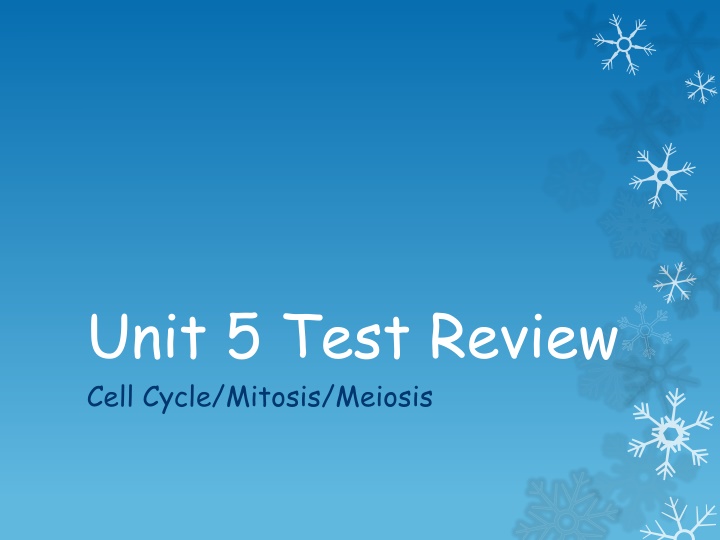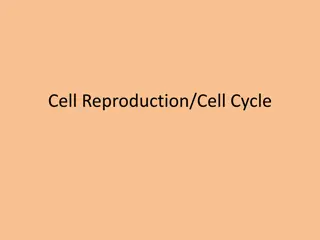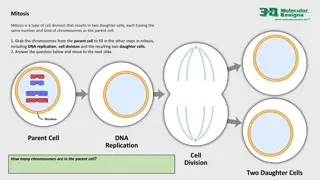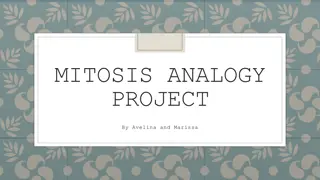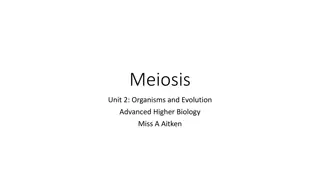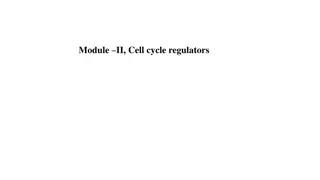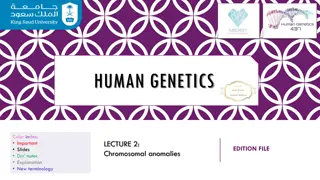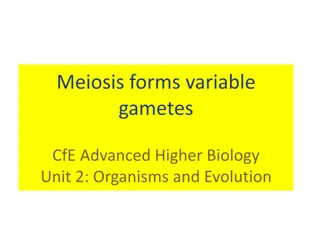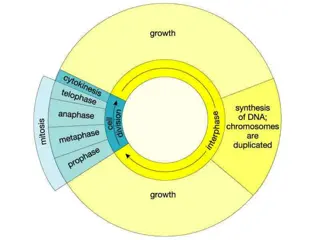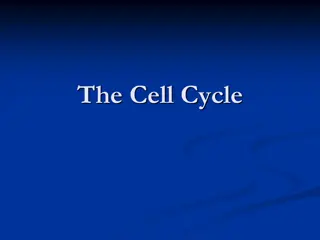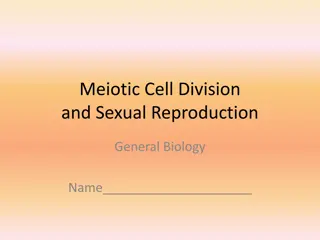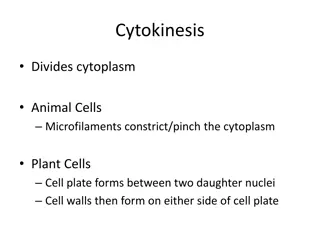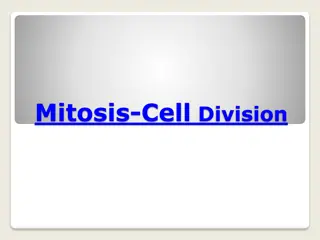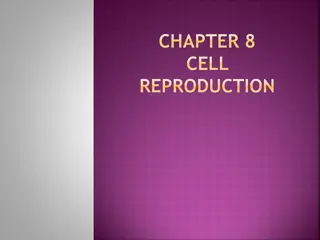Cell Cycle Mitosis Meiosis: Test Review Overview
Dive into the fundamental processes of the cell cycle, mitosis, and meiosis with this comprehensive test review. Explore the intricacies of cell division, chromosome replication, and genetic diversity. Enhance your understanding of key concepts and mechanisms central to cellular biology through a detailed analysis of these critical processes. Prepare effectively for assessments by reviewing essential information, stages, and differences between mitosis and meiosis. Master the core concepts and be ready to demonstrate your knowledge confidently.
Download Presentation

Please find below an Image/Link to download the presentation.
The content on the website is provided AS IS for your information and personal use only. It may not be sold, licensed, or shared on other websites without obtaining consent from the author.If you encounter any issues during the download, it is possible that the publisher has removed the file from their server.
You are allowed to download the files provided on this website for personal or commercial use, subject to the condition that they are used lawfully. All files are the property of their respective owners.
The content on the website is provided AS IS for your information and personal use only. It may not be sold, licensed, or shared on other websites without obtaining consent from the author.
E N D
Presentation Transcript
Unit 5 Test Review Cell Cycle/Mitosis/Meiosis
Question #1 Looking at the diagram below, what would be the correct order of the illustrated stages of mitosis? a. B-D-C-A b.A-B-C-D c. A-B-D-C d.B-C-D-A
Question #2 The diagram below illustrates the stages of the cell cycle. Inhibitors stop the cycle at G1 to avoid cells dividing out of control. When mutations take place and do not allow the inhibitors to stop the cell cycle, what can happen in the body? a. Cell death b. Deformities c. Birth defects d. Cancer
Question #3 Growth and repair of the body cells happen because of ____________. In organisms that reproduce sexually, gametes are produced by _____________. a. Mitosis; meiosis b.Meiosis; mitosis c. Mitosis; conjugation d.Meiosis; gametogenesis
Question #4 Before mitosis can start, what must happen first? a. chromosome replication, formation of the cell plate, growth b. growth of cytoplasm, duplication of cellular organelles, chromosome replication, formation of the cleavage furrow c. growth, replication of chromosomes, duplication of cellular contents, chromosomal alignment in the middle of the cell d. growth and duplication of cell organelles, chromosome replication, growth and repair of chromosomal errors
Question #5 What would be the correct order in the diagram below? a.P-R-Q b.Q-R-P c.R-P-Q d.P-Q-R
Question #6 What is the name of the phase in which cells prepare for division? a.Prophase b.Interphase c.Metaphase d.Cytokinesis
Question #7 How many chromosomes does a human somatic cell have? a. 23 b.46 c. 64 d.92
Question #8 If an inhibitor cannot stop the cell cycle in G1 and the cell cycle continues to prepare and divide cells uncontrollably, what could develop in the body? a. Diabetes b.Extra DNA c. Extra RNA d.Tumor
Question #9 For what reasons do cells divide? a. To make DNA b.To prevent tumors from being created c. To make sex cells that will them combine to form offspring d.For growth, repair and reproduction
Question #10 Organisms begin life as ___________ cells. a.Haploid b.Zygotic c.Embryonic d.Single
Question #11 Cancer cells can appear in many parts of the body. What could be a possible cause for these cells? a. Lack of antibiotics given when the first cell appeared b. Deficiency of vitamins A and C c. Blood clots d. Genetic mutation in the somatic cells
Question #12 What is a zygote? a. A sex cell b.The combination of a sperm and egg cell c. A haploid cell d.A cancerous cell
Question #13 When a zygote develops into a multicellular organism it is because: a. Protein synthesis is followed by meiosis b.Meiosis is followed by mitosis c. Mitosis is followed by cell differentiation d.Meiosis is followed by cell differentiation
Question #14 If you have a test question that mentions UNCONTROLLED cell growth , what type of disease is it making reference to? CANCER
Question #15 Chromosomes align in the middle of the cell: a.Metaphase b.Anaphase c.Telophase d.Prophase
Question #16 Nuclear envelope disappears, chromatin condenses into chromosomes, spindle forms: a. Metaphase b.Prophase c. Anaphase d.Telophase
Question #17 Nuclear envelope forms at each pole, spindle dissolves, chromosomes uncoil: a. Prophase b.Metaphase c. Anaphase d.Telophase e.Cytokinesis
Question #18 Cytoplasmic division: a.Prophase b.Metaphase c.Anaphase d.Telophase e.Cytokinesis
Question #19 Which term describes a very long condensed molecule of DNA? a.Chromosome b.Gene c.Helix d.nucleotide
Question #20 DNA is often referred to as: a.Powerhouse of the cell b.Control center of the cell c.Blueprint of the cell d.Creator of the cell
Question #21 When chromosomes segregate during Meiosis II, the results are: a. A fertilized sperm cell b.A group of genetically identical cells c. The reduction of the number of chromosomes per cell d.The reduction in the total number of cells per organism
Question #22 What process is illustrated in the diagram below? a. Crossing over b.Segregation of sister chromatids c. DNA replication d.Mutation of the content of DNA
Question #23 Which of the statements below describes meiosis? a. It is carried out in all cells for the growth of the individual b. It is considered the first stage of mitosis c. It happens in all body cells except for brain and spinal cord cells d. It happens in the cells of the reproductive organs
Question #24 Interphase is characterized by having three stages G1, S and G2. What event takes place in G1? a. DNA replication b.Formation of the spindle c. Organelle replication d.Growth of the cell
Question #25 Which process does NOT take place during Prophase? a. Chromosomes line up in the middle of the cell b.Coiling of the chromosomes c. Breaking down of the nuclear envelope d.Nucleolus disappears
Question #26 If an error took place during mitosis, what could the possible consequence be? a.Cell death b.Disturbance in fertilization c.Mutations that can lead to cancer d.Both a and c
Question #27 What are the two main stages of cell division? a. Telophase and cytokinesis b.M phase and S phase c. Mitosis and cytokinesis d.Interphase and mitosis
Questions #28 What event takes place during the S phase that is essential for the daughter cell formation in the M phase? a. Chromosomes must be joined together b.DNA replication c. Cytoplasmic separation d.Expansion of the cell membrane
Question #29 During cell differentiation, DNA tells the fertilized egg to: a. Combine with the sperm cell to create many organisms b. Combine with other fertilized eggs c. Divide into many organisms that will vary in size d. Divide into many cells that will vary in function
Question #30 The karyotype below is a: a. Normal male (no genetic disorder) b. Male with trisomy 21 (Down Syndrome) c. Normal female (no genetic disorder) d. Female with trisomy 21 (Down Syndrome)
Question #31 Which stage of mitosis is the diagram below illustrating? a. Prophase b.Metaphase c. Anaphase d.Telophase
Question #32 Which stage of mitosis is the diagram below illustrating? a.Prophase b.Metaphase c.Anaphase d.Telophase
Question #33 Which stage of mitosis is the diagram below illustrating? a.Prophase b.Metaphase c.Anaphase d.Telophase
Question #34 What are homologous chromosomes? a. Chromosomes that are identical b.Chromosomes that are from the same individual c. Chromosomes with similar characteristics d.Chromosomes with different characteristics
